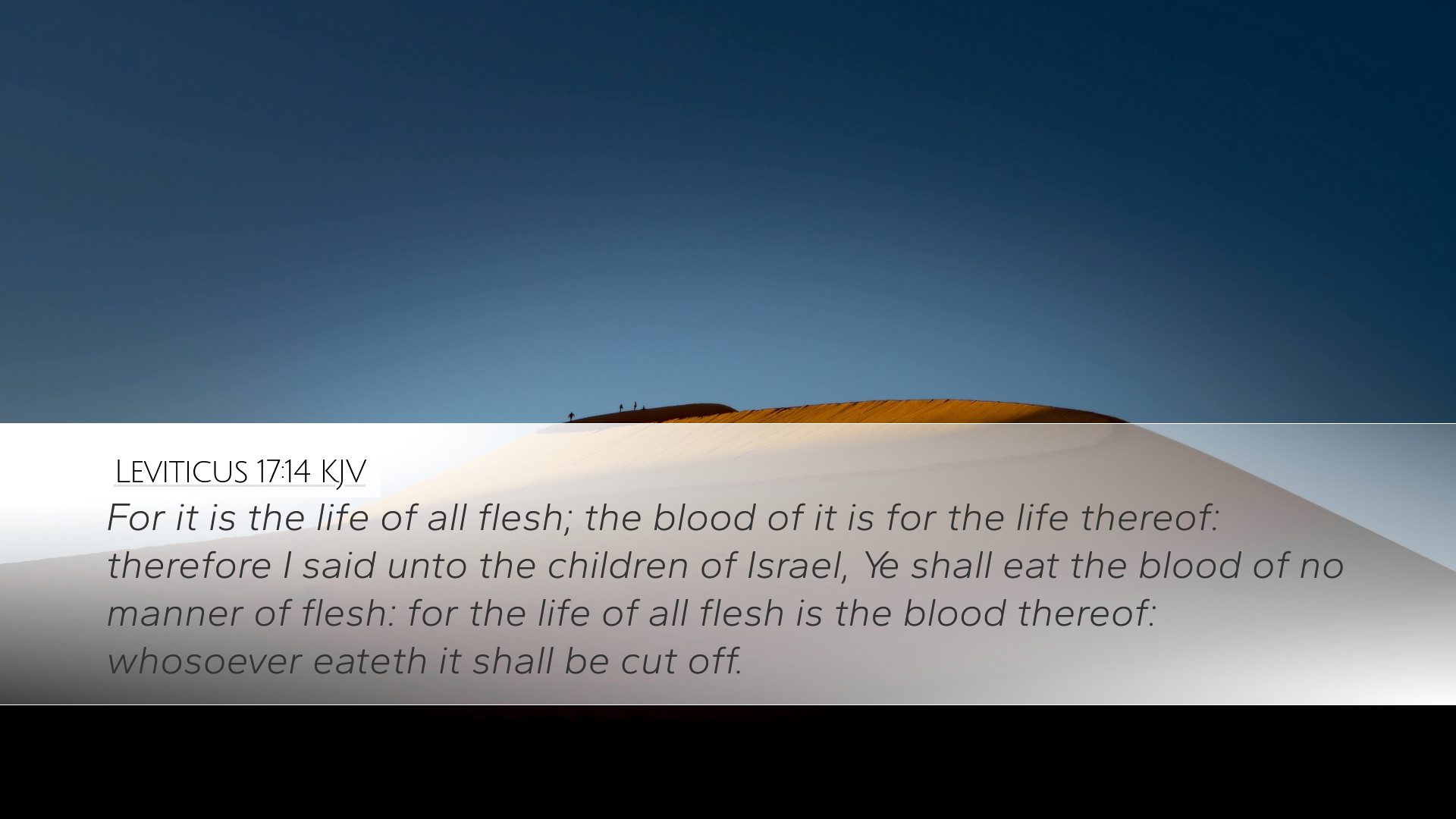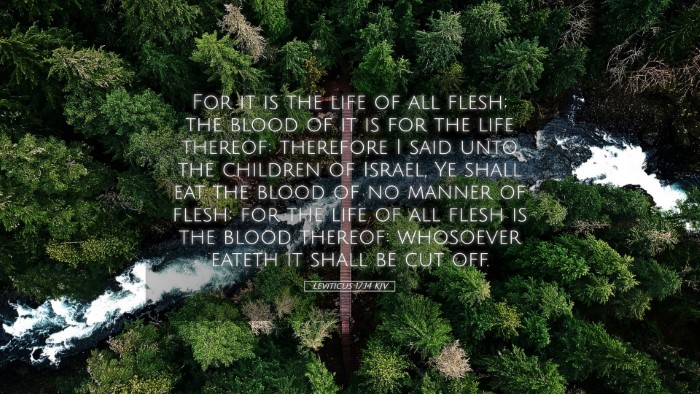Commentary on Leviticus 17:14
Verse: "For it is the lifeblood of all flesh; its blood is its life. Therefore I have said to the Israelites: 'You must not eat the blood of any creature, because the life of every creature is its blood. Anyone who eats it must be cut off.'" (Leviticus 17:14, NIV)
Introduction
The book of Leviticus is a central part of the Pentateuch, containing detailed instructions on ceremonial laws, sacrifices, purity, and holiness. Leviticus 17:14 serves as a pivotal verse within these themes, emphasizing the sanctity of blood in the life of God's people. It invites a profound reflection on the theological implications of blood, life, and the covenant relationship God has established with His people.
Theological Significance of Blood
Blood is presented in scripture as a symbol of life, establishing a deep connection between the physical and spiritual. In Leviticus 17:14, God makes plain the foundational truth that blood is not merely a bodily fluid, but the very essence of life.
- Matthew Henry addresses the view that the life of a creature is in its blood, highlighting that God's command against consuming blood reflects the seriousness with which He regards life itself.
- Albert Barnes notes the emphasis on blood as a central theme in sacrificial rites, where blood is the means of atonement and reconciliation. This foreshadows the ultimate sacrifice found in Christ.
- Adam Clarke elaborates on the idea that consuming blood is an affront to God’s authority, as it symbolizes rebellion against His created order.
God's Command Regarding Blood
The explicit command to abstain from consuming blood is a distinction that sets the Israelites apart from the surrounding nations. This command serves multiple purposes:
- Separation from Pagan Practices: Observant of surrounding cultures that partook in blood consumption as part of pagan rituals, this law serves as a command to maintain purity and holiness.
- Acknowledgment of God’s Sovereignty: By forbidding the consumption of blood, God asserts His dominion over life and death. This act underscores that life belongs to Him alone.
- Teaching of Atonement: Blood signifies the seriousness of sin and the need for atonement, a theme that resonates throughout Scripture and culminates in the sacrifice of Christ.
Covenant Context
Within the covenant framework, the command regarding blood illustrates a larger narrative of redemption and relationship. The Israelites were to see themselves as a people set apart, called to reflect God's holiness.
- Matthew Henry elaborates that the understanding of blood in the covenant context reveals rich layers of meaning, where the shedding of blood points towards atonement for sin.
- Albert Barnes posits that the lifetime of the sacrifices points to the ultimate sacrifice of Christ, framing our understanding of grace and redemption.
Practical Applications for Believers
The implications of Leviticus 17:14 extend beyond ancient Israel, beckoning to contemporary believers with rich theological insights and practical applications:
- Respect for Life: Understanding blood as life urges us to respect all living things, reflecting the sacredness of life in our daily interactions.
- Awareness of Atonement: The Old Testament sacrificial system provides a backdrop for understanding Christ's atoning work. Believers are called to appreciate the depth of this sacrifice and live in gratitude.
- Holiness and Separation: Just as the Israelites were called to be distinct, Christians are invited to live lives that reflect God's holiness in a secular world.
- Community and Faithfulness: The call to abstain from blood connects to a broader sense of community living and faithfulness among believers, encouraging accountability and mutual respect.
Conclusion
Leviticus 17:14 encapsulates a profound truth regarding the sanctity of blood and life, calling the people of Israel—and today’s believers—to a place of reverence for God’s commands. As we delve further into the implications of this verse, we recognize the divine purpose woven throughout the fabric of scripture that leads to Jesus Christ, the ultimate fulfillment of the law and the lifeblood of our faith.
Reflective Questions
- How does understanding the significance of blood deepen your appreciation for the sacrifice of Christ?
- In what ways can you embody the call to respect life in your daily interactions?
- How does this passage inform your understanding of holiness and separation as a believer?


